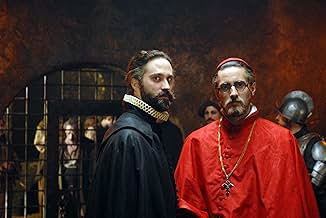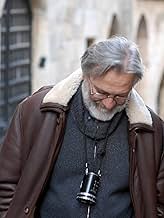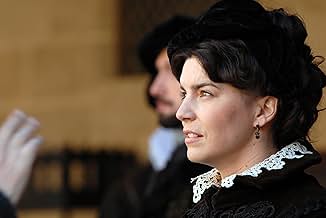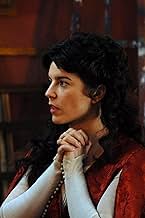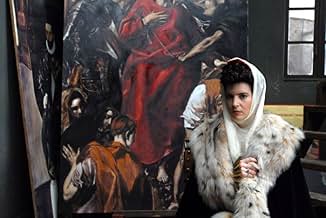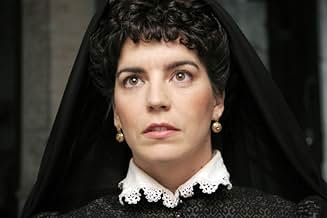El Greco
- 2007
- 1h 59min
Aggiungi una trama nella tua linguaThe story of the uncompromising artist and fighter for freedom, Domenicos Theotokopoulos, known to the world as "El Greco".The story of the uncompromising artist and fighter for freedom, Domenicos Theotokopoulos, known to the world as "El Greco".The story of the uncompromising artist and fighter for freedom, Domenicos Theotokopoulos, known to the world as "El Greco".
- Regia
- Sceneggiatura
- Star
- Premi
- 12 vittorie e 2 candidature totali
- El Greco
- (as Nick Ashdon)
- Duke Da Rimi
- (as Yorgos Christodoulou)
- Don Miguel de las Cuevas
- (as Fermi Reixac)
- Manousos
- (as Theo Zoumpoulidis)
- Titian's Assistant
- (as Yorgos Karamichos)
- Auctioneer
- (as Renos Charalampidis)
- Greco's Father
- (as Yorgos Charalampidis)
- Older Inquisitor
- (as Ricard Borras)
Recensioni in evidenza
It lacks of almost everything. No good dialogues, good actors wasted due to a, being good, a very poor script. It's a voice in off who tells you most part of the story... why do you want actors then I asked.
Probably the customs, colours and music is the only thing you can remember after watching it but not enough. I wanted to stop the movie several times cause is so superficial. You don't get involved at all with any of the characters, not with the story. Actually you don't care about El Greco after 20 min watching it.
I could feel the same frustration when I saw "El Capitán Alatriste". The Spanish movie with the highest budget ever in this country. Very, very disappointing. El Greco is, with all my respects, The Greek-Crap.
For people waiting to explore the artist's character in-depth, understand his passions or his motivation, or admire a kaleidoscope that unlocks the artist's mind to the viewer, disappointment awaits in the corner, because this film does not explore those elements to a satisfactory level.
Nonetheless, the film does not really boast any of that, to start with. The story of it is staged early and very deliberately in the scheme of a broader conflict between light and darkness, and the portrayal of the artist is shown almost entirely through that prism. And it delivers this very well.
Right from the start, an intense scene puts us right in the proper atmosphere, and then the movie continues with a narrative that eventually carries us out seamlessly back into the initial scene, adding context, and appropriately coloring the characters in the meantime.
Costumes are fitting, although their quality ranges, and sometimes poor costume quality sneaks in. But not something that detracts from the bigger picture.
The music is great, of course, and adds a lot of value to the film.
The scenes are seamless and tie well with each other and the narrative that goes on in the background. The scenery is also attractive and adds a lot of character.
The actual script seems to have a lot of weak points (though that is not uncommon in Greek productions, and with this one it is still miles ahead of others).
The first serious issue of the script is the mix of languages. It probably started as a good idea, trying to portray linguistic differentiation, but soon enough, poor accents, weak dialogue (perhaps cut down even further so as not to linguistically challenge the actors) happens almost the entire time and detracts from the film.
The second issue is the dialogues themselves. The actors are great, and perfectly capable of portraying a lot more than the dialogues allow them to say. This is a shame.
The script's saving grace is the English narrative, which is respectable, and the ability of the actors (and the director, sometimes) who manage to convey with emotion what the script's words aren't adequate to show.
The film is otherwise well-laid out, despite some lighting issues (some scenes feel far too bright), and sound issues (audio ranges too wildly between near-whisper and wild shouting and banging).
I didn't have to try to overlook the shortcomings of this film in order to enjoy it. I certainly enjoyed watching it, and was glad I did, despite all the shortcomings.
Oscar nomination? Heh, perhaps not. But definitely a respectable, enjoyable film with some good moments, that is certainly worth watching.
How small it seems now. You can see loftier production values on TV, and probably much better acting and a less grating parade of profundities.
What really offends though is the spirit behind the work. It's not that it is dull and completely without insight about its own craft. It is both these things, but that's a simple incompetence. I mean, here is a film about a man of extraordinary vision who wanted to paint with light, and the 'inspirational' film about him is wholly ordinary, as lush and spiritual as perfume. What poor use of Aris Stavrou, who once liked to puzzle (next to Nikos Nikolaidis) about texture and light.
It's that Smaragdis hoped to capture a bit of Greek soul (not necessarily historical 'truth') and journey with it abroad, a noble aim. Capture us as we dream ourselves to be, feisty and passionate Zorbas, made pensive by centuries of hardship - a bit like Kusturica did for the neighboring Yugoslavs.
The film is set in those centuries of foreign rule, Italian and Ottoman elsewhere. There was no Rennaisance allowed in those times, it would be good to note, no lofty national art as they could develop in the salons of Western Europe. Our painting was religious. Our theater was song and dance, from Thrace to Crete. The collective soul had to pour that way, which is why they still persist and resonate so strongly in these parts - as elsewhere in the former empire.
You will know it's all phony by watching the scene of proud Cretans dancing after a skirmish with the Italians. You'd think, if there was a bit of ancient Greek song rising from the earth, it would be in that scene. If you are ever in the region, go to a Cretan wedding or folk fest, in fact anywhere in rural Greece during times of celebration. Then watch the posturing in the film. Dismal.
If you want to know a bit about these things, to see actual Balkan spirit, seek out a man called Sergei Parajanov. He was Armenian who made films under Soviet rule, but it is the same soul he captured.
Lo sapevi?
- QuizThe last acting performance by Sotiris Moustakas.
- BlooperJust after the battle, the wound on El Greco father's forehead changes places between shots, from left forehead to just over his eyebrow.
- Citazioni
El Greco: You once reached out for God, and your fingers closed on emptiness ; and you didn't learn. How can God speak to you when instead of loving you burn, ruin and spread hatred all around?
El Greco: Now, of course, my turn has come - but you can't burn me... and I'll tell you why :
El Greco: Because I've been burning all my life, my entire life ; not in the fire, in the light. I threw myself into the blaze of it.
El Greco: You light fires because you're afraid to burn. You are afraid of the light and this is why I pity you, my old friend, Niño de Guevara.
El Greco: Because you aren't wrong to be afraid, but every flame you light drives you deeper into the darkness and no matter how many people you burn, you will never escape it.
El Greco: Can the darkness condemn the light?
- Colonne sonoreTa dakrya einai dyo logio
Performed by Loudovikos ton Anogeion
I più visti
- How long is El Greco?Powered by Alexa
Dettagli
- Data di uscita
- Paesi di origine
- Lingue
- Celebre anche come
- El Greco - El último desafío a Dios
- Luoghi delle riprese
- Rhodes, Grecia(Castle of the Grand Master)
- Aziende produttrici
- Vedi altri crediti dell’azienda su IMDbPro
Botteghino
- Lordo in tutto il mondo
- 9.620.040 USD
- Tempo di esecuzione1 ora 59 minuti
- Colore
- Mix di suoni
- Proporzioni
- 1.78 : 1

